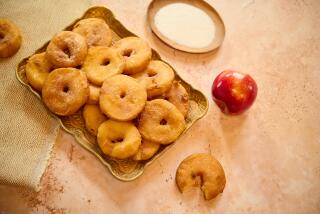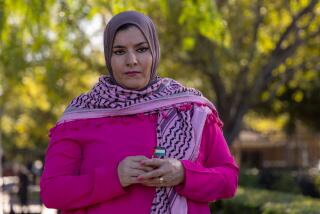In Praise of Faith-Based Food
- Share via
Muslims and Jews might not agree about much that goes on in the Middle East, but when it comes to food, they’re warming up.
Food processing companies of both faiths came together Thursday at the World Ethnic Market show in the Anaheim Convention Center to pitch such delicacies as halal chicken samosas and kosher Italian sausage to retailers from Albertsons to Wild Oats. The trade show, which continues today, is the nation’s first to pair food produced according to the laws of Islam and Judaism, organizers said.
“The halal market in the U.S. is the little brother to the kosher market and has a lot to learn,” said Jalel Aossey, director of Midamar Corp., a producer of certified halal meat and poultry in Cedar Rapids, Iowa. “I wondered if this would work, but food is a good way for people to come together.”
Indeed, participants avoided political talk to concentrate on business.
Midamar offered samples of its seasoned turkey sausage pizza, jumbo beef hot links and shawarma, just around the corner from where AgriProcessors Inc., the nation’s largest kosher meatpacker, pushed tastes of cocktail franks and displayed plump, red rib steaks. This was only the second time the two companies had met, Aossey said, even though AgriProcessors, in Postville, Iowa, is less than three hours from Cedar Rapids.
Both companies are tapping into a growing interest in food produced in accordance with ancient dietary laws, said Antoine Bonnel, a Paris-based food-marketing consultant and partner in the Anaheim trade fair.
Although recent demographic studies show that the U.S. Jewish population stands at between 5 million and 6 million and is slowly declining because of intermarriage and assimilation, the quantity of kosher products available at the supermarket is on the rise. The category expanded 15% to 86,000 products from 2002 to 2004, according to market research firm Mintel International Group of Chicago.
Most of the growth has come in basic goods, such as Oreo cookies, Bush’s vegetarian baked beans and Trader Joe’s pineapple salsa -- items that aren’t part of the Jewish culinary tradition of matzo balls, gefilte fish, brisket and noodle kugel. All told, $190 billion of certified kosher products are sold annually in the United States, but only 5%, at most, is purchased by observant Jews, said Ronald Wise, kosher foods director for wholesaler DPI Distribution Plus Inc. in Ontario.
“More companies realize that when they refurbish a plant or update a recipe, they might as well get kosher certification because it is easy to do and it grows their market,” said Marcia Mogelonsky, an analyst at Mintel International.
Demand for kosher food is swelling because a growing number of non-Jewish consumers are using the label symbol that denotes kosher certification as shorthand to discern which products are vegetarian or contain dairy ingredients.
“We did a study of consumers who say they regularly buy kosher products and found that only 15% said they did so because they keep strictly kosher homes,” Mogelonsky said.
More than half said they bought kosher because they considered it healthier than other choices. Vegetarians and shoppers seeking dairy-free products also are big kosher consumers, the Mintel study found.
In fact, the number of buyers who purchased kosher products because of Jewish law was slightly less than those who bought kosher food because it satisfies Islamic strictures.
“We consider kosher foods halal pretty much,” said Zameera Kazi, who looks for kosher baked goods and rice when shopping for her family of five at the Vons supermarket in Pasadena.
Kazi knows enough about kosher food to make sure to purchase products approved by two of the strictest certifying organizations, the Orthodox Union and OK Kosher Certification.
“I am worried about some of the additives in bread and pig enzymes that are used to make cheese,” said Kazi, who goes to an ethnic store to purchase halal meat.
And although there are many thousands of everyday kosher products to purchase, there are less than 1,000 certified halal food items, few of which are on supermarket shelves. That makes it difficult for Kazi to stick with foods supervised by Islamic authorities.
“Kosher has expanded far outside of the Jewish market,” said Terry O’Neil, spokesman for Ralphs Grocery Co. “We find customers who think it is a higher-quality product. They believe it is healthier and has higher standards.”
The supermarket chain, which has 275 stores in Southern California, has steadily increased its kosher offerings and now operates full kosher meat departments in five stores, complete with rabbinical supervision and separate facilities from its regular butcher section. An additional 75 stores offer fresh kosher poultry.
Many Albertsons and most Trader Joe’s in Southern California also sell fresh kosher beef and poultry.
Albertsons has begun selling certified halal products. About three dozen of its stores in the region offer frozen halal chicken and beef products, including nuggets, beef patties and frankfurters, said spokeswoman Lilia Rodriquez. A handful of stores carry chicken nuggets that are certified as both halal and kosher.
The two religions have similar restrictions on what foods their adherents can eat and how animals should be slaughtered.
Observant Jews and Muslims won’t eat pork, instead sticking to cattle, bison, sheep, goats and fowl. Additionally, Muslims won’t eat foods made with alcohol. Jews who keep kosher don’t eat shellfish, shark and some other seafood species, and they won’t mix a dairy product with a meat product. Although many Muslims will eat kosher meat if they can’t purchase halal, observant Jews stick with kosher meat only.
These restrictions have created a private layer of faith-based food inspection and regulation. Certified products typically carry a trademarked logo on the label, such as a U inside an O for kosher food inspected by the Orthodox Union or an H inside a triangle for halal items certified by Islamic Services of America.
Kosher food also has a secondary level of labeling that has proved important for its recent growth. Any item containing meat will have an M following the certification logo, known as a hekhsher. Any trace of milk will earn a product a D mark. Generally, any food without the M or D will be vegetarian, although these items also can be labeled with the word “pareve,” signifying that it contains no meat or milk.
Although this was the first domestic trade show where halal and kosher products were jointly marketed, certification authorities for each faith have taken initial steps to work together, including persuading the steel industry to stop using animal products to protect metal used in canning, said Joe Regenstein, a Cornell University food science professor and head of the Cornell Kosher Food Initiative.
“We are working with some of the rabbis to organize classes at university food science programs to teach about religious food production,” said Muhammad Chaudry, president and halal administrator for the Islamic Food and Nutrition Council of America.
Sometimes, the council will ask for help in contacting a U.S. food producer that it would like to see make a halal product. On occasion, a kosher certification agency will look for contacts overseas, especially in Muslim nations, Chaudry said.
Last month, Chaudry and Rabbi Jonah Gewirtz of Star-K Kosher Certification held a joint meeting with Wright Enrichment, a vitamin company in Crowley, La., to discuss halal certification and the export market.
“Kosher and halal can be complementary,” Gewirtz said, “and many food producers are going to decide that they want both.”



